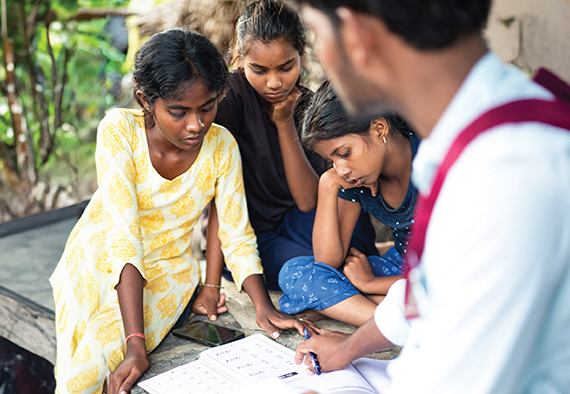Pratham Education Foundation (Pratham) is a learning organisation dedicated to the mission of “Every Child in School and Learning Well”. With a history spanning almost 30 years, Pratham’s transformative journey commenced with pre-school initiatives in the urban slums of Mumbai. Over time, Pratham has impacted millions across India by collecting data at scale to reveal the scope of the learning crisis; generating evidence with which to build and test systematic ways of addressing it; and mobilising governments and communities as well as cross-country partnerships to scale impact.
Pratham's endeavours encompass a diverse array of programs tailored for pre-school and elementary school age groups; girls and women, especially school dropouts; and youth seeking vocational and life skills.
Through programs spanning 25 states, Pratham reached more than 6 million children and youth in 2022-2023. This is achieved through a combination of efforts - directly working with children, youth and communities, and collaborating with state and district-level governments.

Pratham has received notable awards such as the Lui Che Woo Prize, WISE Prize for Innovation, Skoll Award for Social Entrepreneurship, the Henry R Kravis Prize in Leadership, the CNN-IBN Indian of the Year for Public Service, and the Yidan Prize 2021 for education development.
DEDICATED TO LARGE-SCALE CHANGE
As one of India’s largest non-governmental organisations, Pratham employs a strategic focus on delivering high-quality, cost-effective, and scalable interventions to bridge educational gaps. Its ultimate goal is to augment the educational landscape, ensuring that all children not only access education but thrive within it. Pratham collaborates synergistically with governmental bodies, local communities, parents, educators, volunteers, and civil society stakeholders to achieve its mission. Our programs aim to supplement rather than replace governmental efforts. They are implemented on a large scale to not only reach as many children as possible, but also to create a demonstration model for state governments.

FOCUS ON INNOVATION
Pratham’s strategies reconfigure teaching methodologies, break down traditional tactics, and challenge the rote learning mechanisms prevalent in schools. Our programs are outcome-driven and use innovative teaching-learning approaches, materials, and measurement methods.
One key example is the development over 15 years of the approach known today as Teaching at the Right Level (TaRL), that enables children to quickly acquire foundational skills like reading and arithmetic. In this approach, teaching starts at the learning level of the child, regardless of their age or grade.

Another milestone achievement was the inception of the Annual Status of Education Report (ASER) in 2005, a nation-wide citizen-led assessment survey to understand children’s schooling and learning status. Over the years, ASER has played a pivotal role in raising awareness about low foundational learning outcomes and fostering dialogue on educational reforms to ensure equitable and quality learning opportunities for children in the country.
Pratham has also been experimenting with innovative ways of leveraging technology and digital content and integrating all our programs with digital solutions. Pratham recognises the need to modernise teaching and learning approaches, making them more engaging, interactive and adaptable to the digital age.
LOW COST, REPLICABLE MODELS
Pratham has worked to develop low-cost, replicable models that can easily expand and be adopted by other organisations. Thousands of volunteers work with Pratham to implement learning interventions at the grassroots level. These volunteers are mobilised, trained, and mentored by the Pratham team, and provided with teaching-learning materials developed by Pratham.
PROGRAM RESULTS AND ACCOUNTABILITY
Measurement has played a major role in decision-making and in our program evolution. Pratham teams have developed measurement frameworks and implemented them. Across all programs, learning outcomes are measured in ways that are simple, easy to do, and easy to understand. Data is shared and discussed with teams at all levels, and used to improve programs, do course corrections and guide the development of future work.
A POWERFUL VOICE IN THE EDUCATION SECTOR
Over the years, Pratham's advocacy in the education sector has become well recognized and regarded. The Annual Status of Education Report (ASER) has become an important input in the education policies of both the central and state governments. For example, ASER has been cited in major Government of I0ndia documents such as the XI and XII Five Year Plan and many editions of the Economic Survey of India. Most recently, ASER data has been used in following reports: NITI Aayog’s Three Year Action Agenda for 2017-18 to 2019-20, Economic Survey of India 2021-22, and World Bank’s World Development Report 2018. Many state governments are now implementing their own learning assessments, sometimes using tools very similar to the ASER tools and other times in collaboration with the ASER Centre.

In addition, Pratham has partnered with several state governments to implement the TaRL approach and help children acquire foundational skills. In the partnership model, government teachers use this approach over a longer period in the school year (four to six months) with dedicated time for 2-2.5 hours a day.